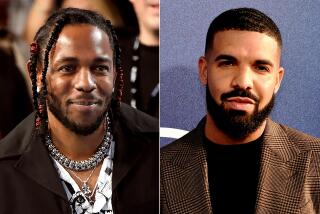Rap Battles of ‘8 Mile’: Flying Words Are Better Than Flying Bullets
- Share via
Rap is the most word-intoxicated genre in the history of American popular music. Against a stark background of pure rhythm, rappers’ words arrive in a torrent of syncopated speech -- rhymes, puns, jokes, allusions -- spilling over the edges of the meter that constrains the lyrics of normal “sung” songs.
The ebullient verbosity and wit of rap make even the most illustrious earlier examples of pop lyric writing -- from the show-tune drolleries of Lorenz Hart and Cole Porter to the poetic flights of Bob Dylan -- seem linguistically austere.
In the nearly quarter of a century since it first penetrated the mainstream, rap has been relentlessly maligned, accused of everything from trashing musical standards to promoting violence and misogyny.
Amid the debate that the music provokes, a central fact is generally overlooked: First and foremost, rap is a celebration of language. That celebration is at the heart of “8 Mile,” the Eminem movie whose box-office gross is the talk of show business. The film’s success has been called a watershed event, signaling rap’s pop preeminence and Eminem’s ascension to Elvis-like multimedia superstardom.
Eminem is, of course, not just a pop star but a provocateur with a talent for equal-opportunity outrage. His gross-out lyrics and renegade posturing have made him the bugbear of everyone from the Gay and Lesbian Alliance Against Defamation to Lynne Cheney, the conservative commentator and wife of the vice president. Predictably, the success of “8 Mile” has been decried in certain quarters as evidence of societal decline: American youth following Eminem down the road to Gomorrah.
Yet “8 Mile” offers a lesson for everyone, from rap’s shrillest public critics to parents concerned about their children’s immersion in an inscrutable music. The film is fairly banal stuff: a victory-of-the-underdog fable that shares with “Rocky” a Great White Hope protagonist and a plot that plods inexorably toward a decisive showdown.
“8 Mile” sags when it portrays the troubled family life and romantic travails of Eminem’s character, Rabbit, but is electric when rappers lock wits in “battles,” trading rapid-fire rhymed boasts and taunts. At this sober post-Sept. 11 moment, shouldn’t we be cheered by the arrival of a box-office blockbuster whose climactic confrontation is not an orgy of death, fireballs and raining glass but a bloodless exchange of rhymed couplets?
In fact, rap battles get at the essence of the music’s appeal. It serves both the body and the brain: While its rhythms ignite the dance floor, its lyrics engage the intellect with a force unique in a world of “moon-June” pop songwriting. Those who complain that rap is repetitive have closed their ears to the mercurial stream of words that flows around its unswerving beat, words that concern not just sex, money and guns but love, politics, the minutiae of everyday life, the whole mad pageant of American social experience.
Eminem’s popularity rests above all on his mastery of this art. Certainly rap is an African American creation, and it is hard not to suspect that rappers have been victims of a subtle racism that undervalues their achievements as lyricists. Americans have a nasty habit of trampling on homegrown flowers -- it was only recently that jazz graduated from a vaguely despised “low art” to a hallowed place in the cultural pantheon.
At a time of international crisis, however, rap’s popularity is remarkably universal: Eminem is a hero to Middle Eastern youth, and the U.S. government is broadcasting hip-hop on the airwaves of Radio Sawa in its campaign for that crucial frontier, the Arab street.
We should be thankful for our rapping ambassadors, beguiling the world with two proud American exports: rhythm and wit.
More to Read
The biggest entertainment stories
Get our big stories about Hollywood, film, television, music, arts, culture and more right in your inbox as soon as they publish.
You may occasionally receive promotional content from the Los Angeles Times.










